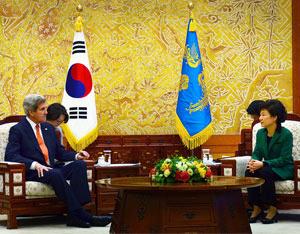After three weeks of threats directed toward South Korea and the United States, North Korea is not backing down from its bellicose rhetoric.
U.S. Secretary of State John Kerry finished his Asian tour to Seoul and Tokyo to meet with leaders from South Korea, Japan and China to negotiate with North Korea, calling leaders from Pyongyang to rekindle talks about nuclear disarming that foundered four years ago.
As the international community has reacted to North Korea’s multiple threats calling for nuclear attacks against the U.S. and South Korea, many South Koreans and American expatriates call the threats “business as usual.”
“To be honest, it’s not that big of a deal,” Leslie Alvarez, a 2012 alumna in communication, said. Alvarez now teaches English in South Korea. “No one really feels the pressure here, especially the foreigners. I’ve signed up for the U.S. embassy here in Seoul just in case, but that was more for my family’s worries.”
Hoon Seok Kim, an alumnus in engineering and a South Korean citizen, said South Koreans are concerned about the threats, but aren’t interpreting them as seriously as international diplomats are.
“North Korea has always threatened us, so we think this is a similar [situation],” Kim said. “The only difference is the level of provoking. This provoking is the highest level they’d ever done.”
Kim said South Koreans are tired of the frequent provocations from the North, and said these recent threats — as recent as Tuesday morning in the Koreas — are ways for Kim Jong Un to prove himself as a leader. Un, the young 29-year-old heir of the late Kim Jong Il, has distanced himself further from the Chinese government, North Korea’s single and estranged ally, since he has been in power.
“Kim Jong Un really wants to show that he is qualified enough for being [like a] powerful king just like his father or grandfather,” Kim said. “He has studied in Switzerland, so many North Koreans have been suspicious about his ideology for governing the country. People thought he is much weaker than previous leaders like Kim Jong Il and Kim Il Sung.”
The tensions may be provoking diplomats and military leaders to mobilize and call for more stringent sanctions and talks, but South Koreans aren’t heading the battle call. Contrarily, many South Koreans feel disappointed about deepened divisions with North Korea, according to Grace Lee, a Korean-American 2012 graduate in biological sciences.
“I think [South Koreans] just feel sorry for the North Korean people,” Lee said. “Not so much for the leaders, but the people. We consider them our people. Basically we just want our leaders to calm down so we can get our country back together.”
For now, North Korea is not calming down, though the international community continues to pressure Pyongyang.
“North Korea must take meaningful steps to show that it will honor commitments it has already made, and it has to observe laws and the norms of international behavior,” Kerry said in a speech in Japan Monday.
In his speech, Kerry referred to the “Pacific dream,” a term that he said implies East Asian countries, especially China, are progressing toward “unprecedented security, economic and social cooperation.” The only thing standing in its way, Kerry said, is North Korea. But that, Lee and Alvarez said, isn’t news.








